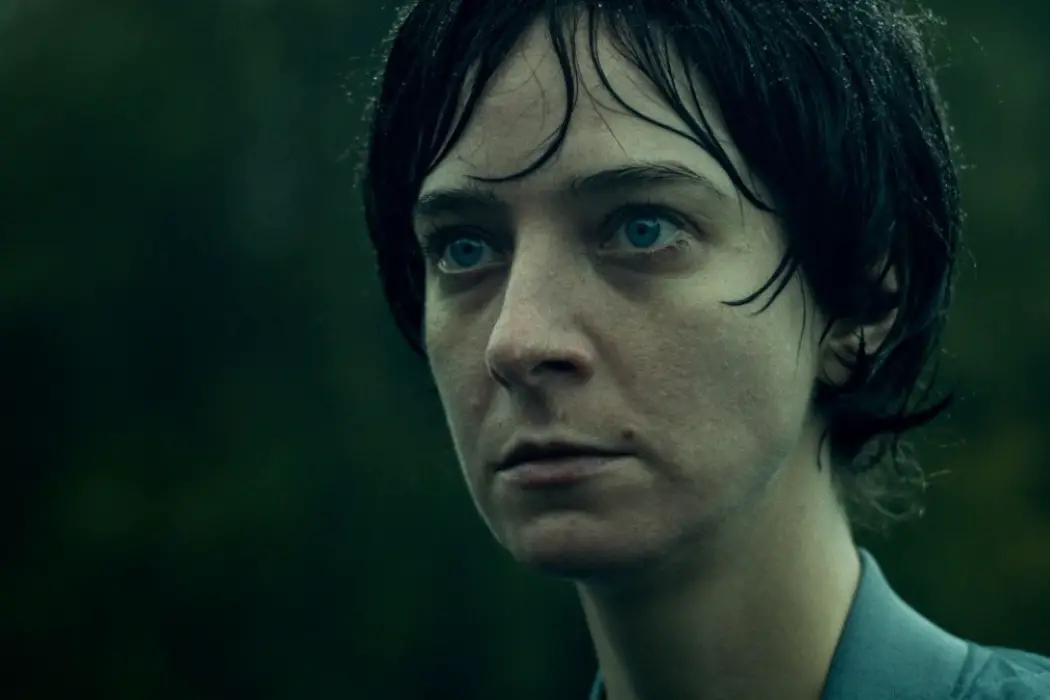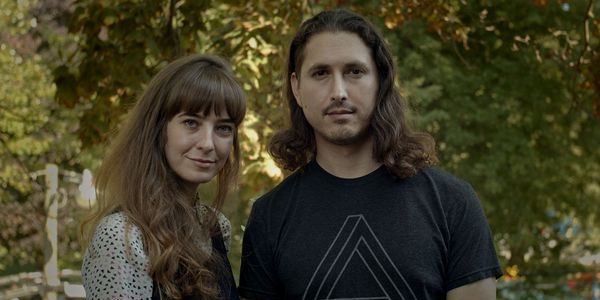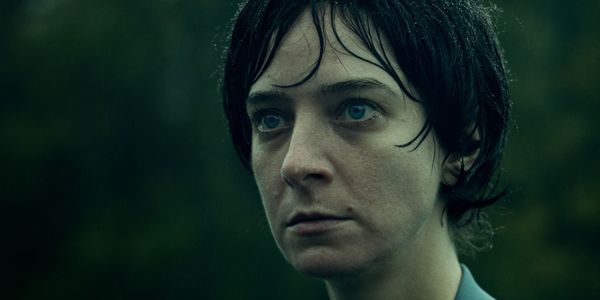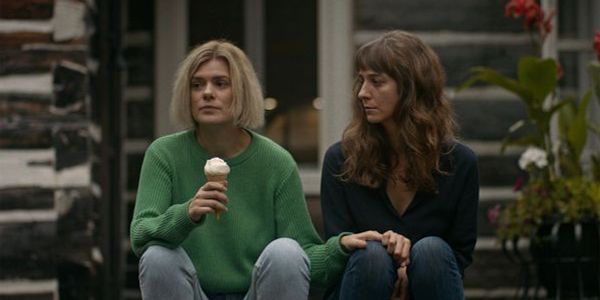Toronto International Film Festival 2020: Interview With Director And Writer Madeleine Sims-Fewer and Dusty Mancinelli of VIOLATION

Wilson is a cinema enthusiast based out of Toronto, Canada.…
In their feature directorial debut, Violation, Canadian filmmakers Madeleine Sims-Fewer and Dusty Mancinelli have crafted a technically astute narrative exploration of trauma that is both visceral and meditative. Screening as part of the 2020 edition of the Toronto International Film Festival, the two filmmakers – with Sims-Fewer also playing the leading role – spoke with Film Inquiry about their creative process in bringing such an important story to the big screen.
Wilson Kwong for Film Inquiry: How did the idea for Violation come about, and what was the writing process like?
Dusty Mancinelli: We met at the TIFF Talent Lab in 2015, and it was there that we decided to start working together. We realized we had similar creative sensibilities, so we made three short films, and all the films explore similar themes.
Madeleine Sims-Fewer: Similar themes of trauma, power dynamics, and gender politics, and they all culminated in the writing of Violation.
Dusty Mancinelli: We received funding through Telefilm Canada’s Talent to Watch (a new program for first-time feature filmmakers), and made it on a micro-budget. We shot it in the mountains in Quebec last summer.
Madeleine Sims-Fewer: And we wrote it in the mountains of Quebec as well. We wanted to come at the revenge genre from a different angle and really almost make an anti-revenge movie. Something where you really see the true nature and toll that revenge would take on an actual person, rather than this cathartic revenge quest where you’re cheering with the character and the act of revenge is her salvation. We really wanted to see how revenge would really destroy a person.
Dusty Mancinelli: What are the psychological and emotional undertakings? And how can it erode your morality? Like Madeleine said, in these revenge films that are built around this idea of wish fulfillment, the audience really wants to see that act of revenge and there’s this cathartic release. In many ways, this film is trying to scare you into not wanting to ever seek revenge because you can see how destructive it is.
And did the two of you always know that the film would be a take on the revenge genre, or were there many themes and ideas that started the creative process?
Madeleine Sims-Fewer: I think we actually had the idea of the revenge film first. And we never came at it with themes that we wanted to explore – it was what really resonated with us at the time.

Dusty Mancinelli: It was more of an organic process. I think when we’re making things, we want them to be as authentic as possible to us at the time. And in that period of time, we were both dealing with past traumas and the film was a perfect vehicle for us to exercise our creativity. We tried to say something about our experiences and use the film as an outlet. There’s so much complexity to the ideas that the film explores.
Were all these ideas something that the two of you developed really quickly, or was this a project that gestated over a long period of time?
Dusty Mancinelli: We’ve been working on this movie for a couple of years, so we definitely have been in it (in the darkness!) for a really long time.
Madeleine Sims-Fewer: I think we actually conceived the idea at TIFF again, but it was 2016 when we first came up with a kernel of the idea.
Dusty Mancinelli: And then it took a while to write it. But the hardest part of the whole process was really after we shot it. In terms of living in that world, it’s really being in the post-production process because you’re surrounded by that footage and the content for so long. You have to connect with the material so that you can try to create a visceral response for the audience. I think that’s probably the most challenging aspect of living in the world.
And now that the film is finished, do you feel like the ideas are still in your minds, or are you completely out of that world?
Dusty Mancinelli: There’s something really cathartic about having made it, and I think we also realized that between the shorts and this feature, it’s a nice conclusion to that topic for us in terms of what we’re interested in exploring. But it’s also still quite fresh in the sense that the film is having its public premiere at the festival. So it’s still fresh to see what people’s perceptions of the movie will be like.
Madeleine Sims-Fewer: And I think it’s definitely exploring things that we’re really excited to talk about and passionate about. And now it’s this new area where we can actually talk about the themes and hopefully help open up discussions with people.
Dusty Mancinelli: This is a really challenging film, but ultimately, the goal of the film is to encourage discourse. To have conversations, and get people talking about difficult subjects that they are usually afraid to talk about.
Specifically for Madeleine, being a writer, director, and actor in this film, do you think being so creatively invested made the entire process easier or more challenging?
Madeleine Sims-Fewer: In a way, it made it easier because I knew how tough it was going to be for that role. We knew how naturalistic and grounded we wanted the performances to be, so it’s easy in the sense that the two of us could push me as an actor much further than we ever could have pushed anyone else. But it was hard in that it was very emotionally and physically draining.
Dusty Mancinelli: And just the amount of time Madeleine had to put in as the director, she also had to put in that time to prep as an actor. So she was working herself to death in preparation, and then again on set. There’s a moment in the film where she’s dismembering the body and stops to vomit, and it was really important to Madeleine for that to look and feel real. We had used vomit rigs in the past and knew what it was, but they have a tendency to come out fake. We were so interested in this kind of grounded realism for the effects, and Madeleine was like, “No, I’m going to do this. I’m going to throw up on camera.”
Now that you mention it, it actually did look very real in the film.
Dusty Mancinelli: Yeah, and it was [real]. It was a pint of salt water and a pint of egg whites. And that’s something that I would never ask an actor to do, but having Madeleine be the star and the director, and her saying, “Look, I really want this to be so real that I want to do this,” is pretty amazing.
Madeleine Sims-Fewer: That was really the benefit of it, but it was quite grueling.

Something else that feels very real in the film are the interactions between all the different characters, most of which are pretty antagonistic interactions. How did you prepare all the actors for the film? Were there a lot of rehearsals beforehand to strengthen these relationships we see on screen?
Madeleine Sims-Fewer: We did do a lot of rehearsals. Our process as directors is so performance-based, and performances are everything to us.
Dusty Mancinelli: We had built a strong relationship with Jesse LaVercombe [main antagonist of the film], who was in two of our short films in the past, and Madeleine also acted with him in one of our shorts. So I think that they had this natural chemistry just from past projects, and it was quite easy to jump back in. The nuance of the film is that we’re showing a really complicated character who is someone that’s very easy to villainize.
But we were trying to show you that he is not this malicious, evil person, even if he did do something quite terrible. And hopefully, that challenges audiences to think about how do we deal with these situations. Because we’re living in a time right now where everything’s quite binary and divisive, and we really want to encourage more moderation and middle ground.
Madeleine Sims-Fewer: Something that we wanted to explore, which is really tough, is that it’s not just good people who are wronged and it’s not just bad people who do the wrong thing. And going back to rehearsing, we spent a lot of time living in the spaces with the characters and creating memories, just like improvising. We would wake up in the morning and act out a day in the life of these characters, finding moments from their histories where it wasn’t contentious so that we could actually use it in character.
Given how contentious a lot of the themes and the messaging are in the film, how do you think audiences will react to Violation?
Dusty Mancinelli: We have no clue. I think it’s going to be polarizing because it’s graphic and a lot of people are afraid of some of the content that’s in there.
Madeleine Sims-Fewer: We also think and realize that people aren’t used to seeing explicit male nudity in films. People are very used to seeing female nudity, and we’ve become desensitized to it and comfortable with it. And I think that’s going to be shocking and very uncomfortable for some people.
Dusty Mancinelli: It was just important to us. In that space of the revenge genre, you often see women being sexualized, and female nudity is sort of the norm. We flipped that on its head here, but as Madeleine said, it’s going to be just really confronting people and making them quite uncomfortable. So it will be interesting to see what the conversations are like, but I think it’s going to get people talking.
Madeleine Sims-Fewer: We’re also not used to seeing female antiheroes, and we’re not used to relating to female characters who aren’t just straight-up good guys. I think audiences are starting to get used to relating to women who do the wrong thing, but it’s not something that we’re totally comfortable with. So I think that will also rattle a few cages.

The horror elements of the film are also very interesting. Did you always know that the film was going to take on elements of horror right from the beginning?
Dusty Mancinelli: That was really a big part for us, we’re big fans of older horror films from the ’70s, like Don’t Look Now, for example.
Madeleine Sims-Fewer: And films that maybe you wouldn’t say are horror, like Caché by Michael Haneke or Fat Girl by Catherine Breillat. Movies that are dramas, but have these really terrifying and horrific elements to them.
Dusty Mancinelli: For us, horror is a great space to elevate drama. And if you can find these sequences that are quite horrific and frightening, that helps you amplify and charge the dynamics between the characters and the drama itself.
Madeleine Sims-Fewer: Also, something that we really wanted to do with Violation was create a visceral experience for the audience. And horror is such a perfect a way to create that feeling and that bodily response. We wanted the audience to go with Miriam through a sensory journey and feel what she’s feeling.
Dusty Mancinelli: Trying to mimic that sense of post-traumatic stress that she’s under is really what the film is all about. So hopefully as you watch the film, you’re put in these distressing situations that really amplify what she is going through and you can form more of a connection with her character.
I think part of that visceral response comes from the violence in the film too. I don’t want to ask a question that would give anything away, but what was your approach to violence in the film?
Dusty Mancinelli: We were really interested in grounding it in realism. When you see gore and horrific violent acts in horror films, it’s often very glorified. It’s in your face, it’s close up, it’s gushing blood and it’s meant to scare you and gross you out. But we were more interested in the overall experience. Could we try to capture a moment where it felt like you were a fly on the wall, like a documentary observational moment?
And that meant staying really wide, and it meant trying to have these really long uninterrupted moments. And there’s not a lot of violence in the film, there’s just a couple of moments, but they feel so violent because of how they’re portrayed. I also think if we used close-ups to try to accentuate the violence, it would almost cheapen it. We were really quite lucky to be working with this really talented special effects artist, Tenille Shockey, who works at MindWarp. They do all the big horror films, and so she really helped elevate the film.
Maybe we talk about the score for the film by Andrea Boccadoro. It’s one of my favourite parts of Violation, and complements the film so nicely.
Dusty Mancinelli: We met Andrea at the Reykjavik Film Festival in Iceland years ago, and then Madeleine met him in Berlin, and it was just this really funny coincidence that we had both met him. But he’s classically trained and really heavily influenced by Italian composers, and we had a very clear vision of wanting to elevate the tone of the movie through the music and trying to capture that uneasiness.
Madeleine Sims-Fewer: We wanted it to feel like a mixture of Baroque music and avant-garde, and that was the direction we gave him. They’re two very contrasting ideas, but he took those ideas and really was spectacularly creative.
Dusty Mancinelli: It’s also so amazing at this budget level to be able to do a live recording with actual musicians, and so we were just really thrilled that he was able to get really talented musicians to come in and play. But I think for us, we knew that the music was going to act as transitional moments to help really push us through to the next sequence, rather than letting the music tell you what to think and feel in a scene. Except for one scene.
Madeleine Sims-Fewer: There’s one scene in particular – and I don’t want to spoil too much – but he created a very beautiful choral avant-garde piece. He really worked with the emotion of the scene to capture this feeling of detachment, and of being frozen and not being able to act because you’re so horrified that the character of Miriam is so horrified. And I think that that works so well. Andrea is very restrained with the emotion that he puts into the music and never tells you what to think with the music, which is really wonderful.
Now that film festivals are so different than what they used to be, how do you think having a predominantly virtual environment changes the trajectory of a film like Violation? Or does it change it at all?
Dusty Mancinelli: I think it’s quite serendipitous for us. Normally, TIFF shows a lot of movies and it’s easy for a tiny little movie like this to get lost in a crowd. And I think with them reducing their slates to 50 films, suddenly we get a lot more attention and more people are noticing the film. One thing I’m also noticing with these virtual screenings is that a lot of Canadians want to come to TIFF but can’t, because they just can’t afford flying out. And the idea now that people across Canada can just login and watch the film has made the festival far more accessible than it normally is. Sundance is planning to do something very similar next year, so there’s something interesting about how these festivals are becoming more accessible than they once were. So I’m optimistic about it.
Film Inquiry thanks Dusty Mancinelli and Madeleine Sims-Fewer for taking the time to speak with us!
Does content like this matter to you?
Become a Member and support film journalism. Unlock access to all of Film Inquiry`s great articles. Join a community of like-minded readers who are passionate about cinema - get access to our private members Network, give back to independent filmmakers, and more.
Wilson is a cinema enthusiast based out of Toronto, Canada. He escapes from his day job by writing random thoughts about cinema on the internet. Although he has a longstanding penchant for Hong Kong cinema, he considers himself to be an advocate for Asian cinema in general. He has been attending the Toronto International Film Festival every year since 2005, and more of his work can be found on his website: www.wilson-kwong.com.













